#sfirot
Explore tagged Tumblr posts
Text
The 5784 / 2024 omer counter is live and expanded to twice the former length with more prayers, poetic translations, art, and space to count the omer your way. Counter and colouring companion are available on kofi, and stickers and more available on redbubble.
Here's a peek at the inside of the omer counter:


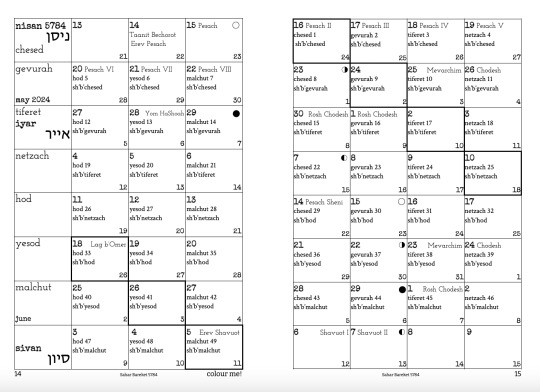
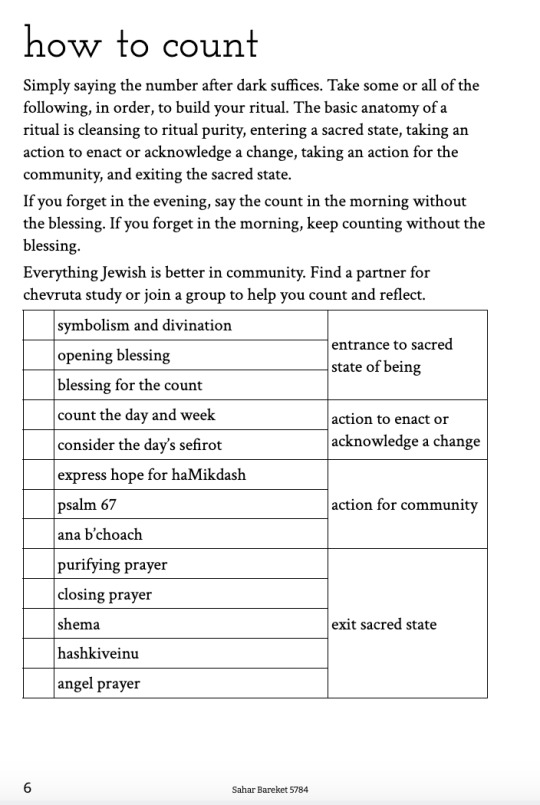
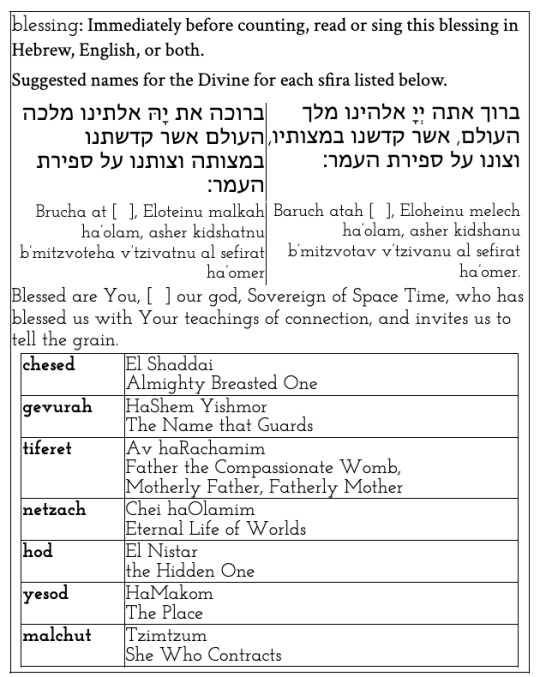
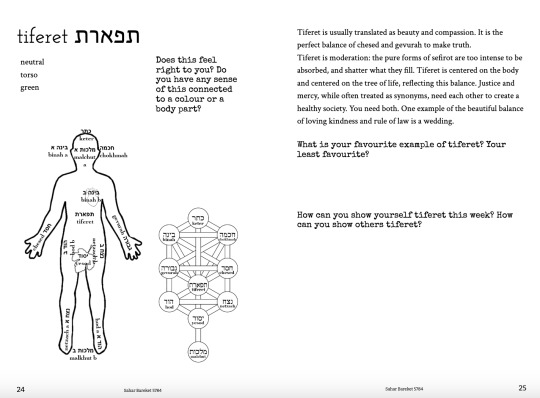
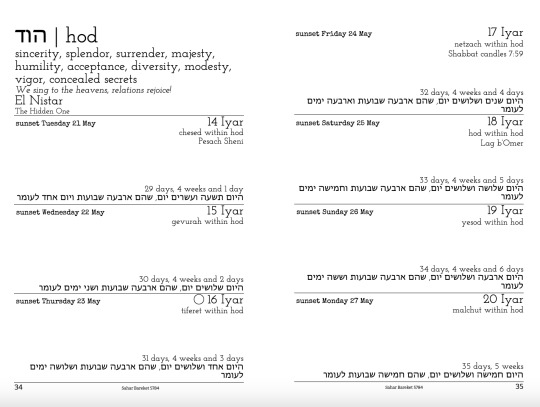
Image description: 7 screenshots of the omer counter, showing a colour cover, a black and white cover, a multi-month spread, an explanation of how to count with a list of pieces of the ritual, the omer bracha with 7 different names of Gd, a week spread with journaling prompts and diagrams, and a week's worth of dailies.
And some peeks at the colouring companion:

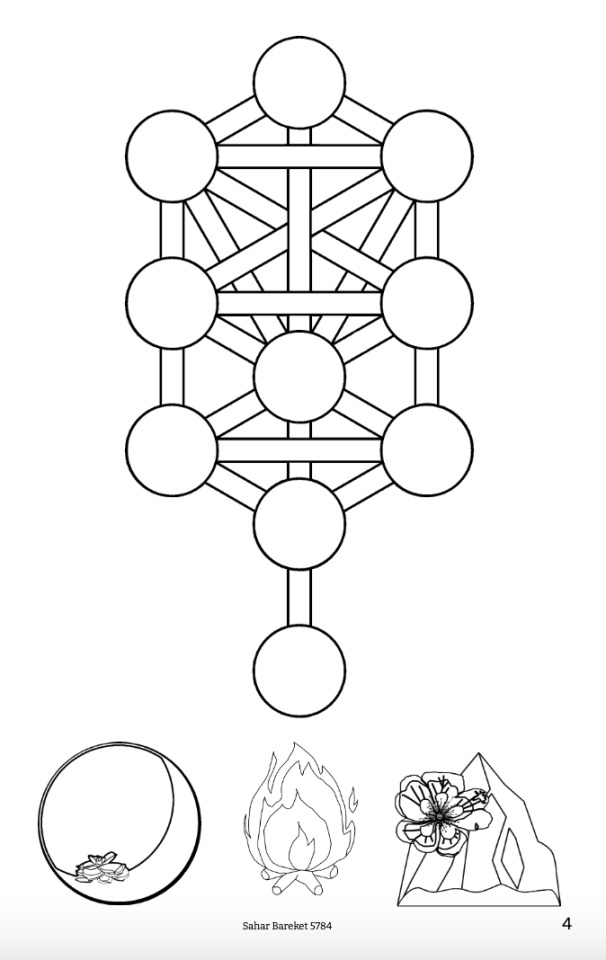
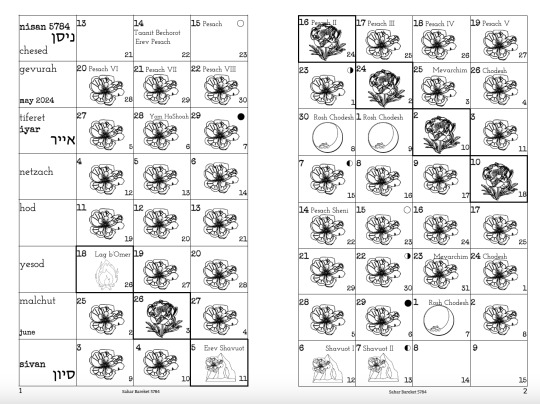
Image description. 3 screenshots of black and white imagesfrom the counter, showing the pomegranate spiral with wheat sheaf cover; an empty eitz chayim diagram with crescent moon and succulent, bonfire, and mountain with a rose, and a multimonth Hebrew and Gregorian double spread with peonies, roses, moons, a bonfire, and flowered mountains on each day of the omer and Shavuot.
If you like the cover image, you can buy three different versions of it on stickers, stationary, clothing, and more. You can also get a full colour version of the sfira tree with roses, just the roses (60 of them!), or a minipack of stickers for your counter.
Like this but can't buy? Even a reblog helps support a queer, disabled, mixed race artist and parent!

Image description: a branch of seven pomegranate blossoms on a blue circle, with a spiral of black moon phases getting smaller as they approach the center. In center is a sheaf of 7 stalks of wheat.
#jewish#judaism#jewish art#digital art#queer art#queer#queer jewish art#queer jew#stickers#jewish witchcraft#jewitch#flowers#roses#tree of life#eitz chayim#sfira#sfirot#sefira#sefirot#omer#counting the omer#omer counter#print it yourself
14 notes
·
View notes
Text
How powerful Lilith really is...
...in the Zohar?
Kinda connected to my previous article (of which Lilith's depiction in the Zohar was a major part of), I would also want to shed some light on this rather obscure information.
With Lilith's power in the Zohar, she is actually described as actually stronger than her husband, Samael/Satan (Pinchas, verse 362): ""The appendix of the liver" MEANS a woman of harlotry, THAT IS LILIT, who comes out and emerges from the liver, THAT IS SAMAEL, to mislead people and denounce them, and she leaves the male to practice prostitution. And that is why IT IS WRITTEN: "the appendix of the liver;" "the appendix above the liver" MEANS THAT, after her fornications, she rises above him. She has "a harlot's forehead" (Yirmeyah 3:3) and subdues her husband, who is SAMAEL, WHO IS CALLED 'liver,' with the anger of the gall, being a quarrelsome and anger-prone wife who rules over her male. THUS "The harlot's forehead" has control over the liver, WHICH IS SAMAEL, BECAUSE SHE IS a quarrelsome, angry woman AND IS THEREFORE CALLED "THE APPENDIX ABOVE THE LIVER."
While this fragment could be seen as just describing Lilith "wearing the pants" in the relationship, there are further statements that confirm Lilith's power (and by proxy being stronger than Samael). In another verse, Lilith is called the most powerful sprit (Vayikra, verse 316): "Come and see: In a hole by the great, supernal abyss, there is a certain female, a spirit above all spirits. We have explained that its name is Lilit."
And the most interesting, and controversial part - Lilith (also called the "evil maid" or "evil maidservant") manged to defeat an aspect of God, the Shekhinah (also called the Matron or Matronit) (Mishpatim, verses 450-452): "So many blessings did the evil maidservant steal from the Shechinah through heavy tax burdens, different kinds of harsh judgments against the SHECHINAH'S children, numerous Temple sacrifices deprived from the Matron, the shaming of the Matron," ... "The pit represents the evil wife, Lilit, in her house, namely the prison. The evil maid seized the Matron and her children, NAMELY THE CHILDREN OF YISRAEL, put them in her exile, placed them in twisted chains, and tied their hands to the back; "she dwells among the nations, she finds no rest" (Eichah 1:3)."
As well taking the Shekhinah's power and position (Bereshit A, verse 268): "BECAUSE WHEN THE SHECHINAH IS IN EXILE, LILIT AND THE MIXED MULTITUDE RECEIVE HIS ABUNDANCE, WHICH WAS SUPPOSED TO BE GIVEN TO THE SHECHINAH. FOR THIS REASON, THE EXILE IS CONSIDERED THE NAKEDNESS OF SUPERNAL YISRAEL."
While this is meant to be a metaphor for the exile of the Jews/Israelites, it also is meant to be direct real event, as the Bible states places and events on Earth, have (greater) counterparts in Heaven.
It's also notable the Shekinah is mentioned defeating and even destroying Samael in the future (Shoftim, verse 8): "Its members are pieces of wood in which a fire will burn, which is the fire of the commandment, in each member, to burn Samael BY the supernal Shechinah, THAT IS BINAH, with a tree that is Tiferet, and with all the trees, MEANING SFIROT, that are attached TO TIFERET. When the fire of the higher descends over the wood of the sacrifice, "the stranger that comes near shall be put to death" (Bemidbar 1:51), because he will be burned IN THE FIRE."
Defeating even an aspect of God, arguably makes Lilith the most powerful demon in (actual religious) Abrahamic scripture and literature.
Then why Lilith is often depicted as inferior, even visibly to Samael/Satan/Lucifer etc., and rarely equal in power at best? Well, as I mentioned in Demon WLW in Kabbalah, translated works of Kabbalah were in past harder to acquire, people often reading works that quoted or summarized them, that omitted this information. Later Kabbalistic writings also didn't depict Lilith as this powerful.
In general, aside from also sexism (not always and more in the past), Satan also is seen as the ultimate force of evil, with it being weird for many that another being like Lilith could equal or even exceed him in power. The verse with Lilith taking Shekhinah's power and position were also interpreted (I personally think misinterpreted) as God taking Lilith as a wife/consort/lover in the place of the Shekhinah.
8 notes
·
View notes
Note
I know that in Lobotomy Corporation, there's a group of characters named after the Kaballah. Is there much more to naming them after it?
yayyyyy I get to talk about this!!
firstly I'd just like to say, kabbalah should not be used like this. It's cultural appropriation and desecration, but if you ignore the blatant disrespect, they obviously did some amount of surface level research, and it is kinda cool. I haven't actually learned kabbalah, because you need to be 40 to be allowed to, as well as whole bunch of other stuff, but I have learned chassidus, which is derivative, and it's allowed to be taught and learned. And also I have the wikipedia page open. Please keep in mind, this is all extremely surface level. There is so much more to all of this, but the only proper way to explain everything to someone who doesn't have any experience involves 3 different, extremely thick books.
so, Sfirot first, or as the game calls them, sephirot. Sfirah comes from the root word ס.פ.ר which means writing, sfirah usually means counting, in this case I'm not sure exactly what's the purpose of the word though. The sfirot are traits of god, through which he creates the world, we in turn also have them. I'm gonna go from top to bottom, (or bottom to top, because the game flipped them.) and go over each of their meanings
Angela is just a name, she's not based on a sfira.
Malkuth, based on Malkut, which is the noun form of the adjective from the root word מ.ל.ך meaning king or queen (root words are non gendered), this is just god's rule over the world, and the divine piece of him that is in us. There's nothing concrete about it. Malkuth leads the control team, which could be compared to being a queen.
Yesod, יסוד which is the noun form of the root י.ס.ד, meaning base, or foundation. This is why it's at the bottom of the sfirot, and it doesn't make sense flipped! Anyway, it is literally the foundation of the world, and the foundation of our emotions, and it's built with truth, which is why lying is so bad. I don't know why they chose to put it as the Information team leader.
netzach, נצח is it's own root word. It means eternity. it's what keeps the world going. It's our confidence. Basically

^ opposite of that... Security is sorta fitting by a long stretch, cuz he keeps the facility going, but like... ehhhhhh.
Hod, root word, means greatness. It's literally god's extreme overwhelming reality, and in us, it should manifest in humility ironically enough, because we should always be humble in the face of god's greatness. Hod's personality is actually really fitting, but I have no idea how it correlates to training team.
Tiphereth, or tiferet, תפארת which is the noun form of פאר meaning beauty, the last of the traits forming Chagat chassidus, which is emotionally based chassidus. This is probably irrelevant. It is god's beauty, and uh, according to wikipedia, it's our mercy/compassion, but as far as I know, it's supposed to be our glorifying of god. It doesn't make sense for it to be the command center, and also Tiphereth A completely contradicts it in terms of personality, but Tipheret B at least is accurate
Geburah, or Gvura, גבורה which is the noun form of ג.ב.ר meaning power, second trait of chagat, it's god's power and might, and our self-discipline. Extremely accurate character actually, 10/10, no notes.
Chesed, חסד, root word, meaning kindness, it's god's love for us, which includes mercy, forgiveness, help, uplifting, etc. it's the first and most important trait of Chagat which is still irrelevant, it's our ability to help others also. In game, the old Chesed is extremely accurate, but also the one you see during gameplay, is what you get if you have chesed without gvura, this actually touches on some core principles of chagat, but I don't actually trust project moon to have done that on purpose.
Hokma, or Chochma, חוכמה noun form of root ח.כ.ם, meaning smart or knowledge. This is the first trait of Chabad Chassidus (that's what my denomination is named after!!!) which is intellectually based chassidus. This is also irrelevant. This isn't a collection of knowledge, the best way I think to describe it is the intelligence stat in dnd. It's god's intelligence stat, which is obv infinite, and also our intelligence stat, and it should awaken Humility also, because of the intelligent comparison of us to god. His personality is spot on, but his job would be better handled by da'at I think.
Binah בינה which is the noun form of the root ב.י.ן not to be confused with בן boy, or בין between, it means understanding. Second trait of Chabad. If chochma is int, this is wisdom stat. Also, god has his stat in the infinite, we have it in normal levels, understanding also awakens joy, and happiness, because when you understand something, you're happy about it. Basically the opposite of the character again, and her job is irrelevant to the sfirah as well.
Da'at doesn't have a character, Carmen correlates though. Da'at דעת noun form of י.ד.ע meaning knowledge, but not in the chochma way, this is literally stuff you know. Last trait of Chabad. for god, this is the world itself, or maybe, the world itself is god's da'at, I'm not really sure. Our da'at is strengthened by learning torah, which is god's da'at, which unifies us with him. Sorry, it's complicated. Her job is sorta by a stretch, this.
And then there's no character linked with Keter. Keter כתר means crown. God's rulership over the world. The meaning of it for us is way too complicated to simplify into a tumblr post. This actually does kinda correlate with Angela though, so... idk what to make of that.
besides the sfirot, theres's some other stuff
the layers, are based on the actual worlds of hishtalshelut. The devs didn't even bother to include all four though, let alone pay attention to any sort of significance to them, so no point in doing that here either. atzilut is the highest world which is completely divine and non-physical, and the worlds get decreasingly divine in the order of atzilut, briyah, yetzirah, asiyah. They have a huge amount of significance in many ways, it was all completely ignored, maybe that's for the best though, less cultural appropriation.
Qlipoth, or klipot, means peels, (the object, not the verb for removing it), it's basically all the bad stuff, anything that's completely forbidden is one of the klipot. They cover us when we sin and distance us from god basically. Sorta translates
I'm pretty sure my venting about this is what caused this question in the first place but I'll bring it up again
the risk levels are letter/numbers. they go zayin, tet, he, vav, aleph, which is the number sequence 7,9,5,6,1, which is fucking stupid.
feel free to look this up and research more, but don't speculate or think about other ways to use this unless you know it really really in depth, because misuse of kabbalah has a history of causing a lot of Jewish death. If you want to learn it in depth, the Tanya is a simplification of it made to be taught to people who aren't fit to learn actual kabbalah, and lessons in Tanya is one of the easiest to understand explanations of the Tanya. I might be biased with that recommendation though, because I'm chabad.
2 notes
·
View notes
Text
כַּתָּמָר גֵּאֶה
עֶשֶׂר סְפִירוֹת עֲנָפָיו –
הַתֶּלֶם חָרוּשׂ
tall date palm
its Branches are ten Sfirot -
furrowed land
0 notes
Text
Йегуда Ашлаг (Бааль Сулам) (1884-1954)
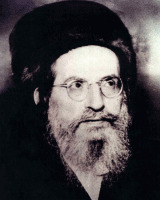
Рав Йегуда Лейб Алеви Ашлаг (Бааль Сулам) родился в Варшаве, в 1884 г. Уже с ранних лет был отмечен учителями как человек, непрестанно стремящийся к раскрытию тайн мироздания. Он поражает своих наставников блестящим знанием всех основополагающих книг иудаизма, а также прочитывает в оригинале произведения выдающихся западных философов, среди которых Кант, Гегель, Шопенгауэр, Ницше и Маркс. Впоследствии он сравнит их взгляды с позицией науки каббала в своих статьях.
По окончании Первой мировой войны (в 1921 г.) Бааль Сулам покидает Польшу и перевозит свою семью в Израиль (Палестину). Сразу по прибытию в Иерусалим он отправляется в древнюю каббалистическую школу Бейт Эль, бывшую в течение 200 лет центром изучения каббалы, но быстро разочаровывается в иерусалимских каббалистах, уровне их знаний и подходе к изучению каббалы. Видя сложившуюся ситуацию духовного падения масс и желая изменить ход исторического развития, предвещающего наступление новой катастрофы, периода тяжелых страданий и лишений, Бааль Сулам организовывает группу учеников и начинает писать книги, чтобы обучить людей методике правильного восприятия реальности и разумного существования в ней. Уже в Польше он стал известен как великий знаток каббалы, ученик мудрейших каббалистов, продолжавших цепочку передачи каббалистических знаний после Бааль Шем-Това.
В 1926 г. Бааль Сулам уезжает в Лондон, где на протяжении двух лет работает над написанием комментария Сияющий лик [Sefer Panim Meirot u-Masbirot] на книгу Ари Древо жизни. Весь этот период он ведет тесную переписку со своими учениками, в которой объясняет им основные принципы духовной работы человека [ 1]. Вернувшись в Иерусалим (1928), он продолжает преподавать каббалу и писать, и через несколько лет издает свой монументальный труд трактат под названием Учение Десяти Сфирот [Talmud Eser ha-Sefirot]. Десять сфирот это внутренняя структура мироздания, определяющая все его строение, включая духовный мир и наш мир, души и населяющие миров все сводится к системе десяти сфирот.
Книга Учение Десяти Сфирот состоит из шести томов, свыше 2 000 страниц, и включает в себя все, что было создано каббалистами на протяжении истории науки каббала. В отличие от своих предшественников, Бааль Сулам составил ее, следуя всем канонам академического учебника: в ней есть список контрольных вопросов и ответов для самопроверки, словарь определений слов и основных понятий, алфавитный указатель и сноски на литературные источники. В первой части книги Бааль Сулам пишет о ее задаче: В этом моем анализе я приложил усилия объяснить десять сфирот, как этому научил нас божественный мудрец Аризаль, в соответствии с их духовной чистотой, свободной от каких бы то ни было осязаемых понятий, чтобы любой начинающий мог приступить к изучению науки каббала и не потерпеть неудач по причине материализации значений слов или других ошибок, так как понимание этих десяти сфирот откроет также возможность рассмотреть и узнать, как понимать остальные вопросы этой науки [ 2]. В своих работах Бааль Сулам стремился выразить внутреннюю суть каббалы, очистить ее от примитивных средневековых представлений о ней, как о мистике и магии, полной чудес и абсурдных фантасмагорий; он видел в этой науке мощное орудие для изменения и совершенствования человека.
В 1940 г. он начинает писать комментарий на книгу Зоар, под названием Перуш а-Сулам [Perush ha-Sulam] (иврит букв. комментарий лестницы). Несмотря на тяжелое состояние здоровья, он непрестанно работает по восемнадцать часов в сутки в течение тринадцати лет. О цели создания этого фундаментального комментария Бааль Сулам пишет в Предисловии к книге Зоар:
Из вышесказанного можно понять причину духовной тьмы и незнания, обнаруживаемых в нашем поколении, чего не было во всех предыдущих поколениях. И это потому, что люди перестали заниматься изучением науки каббала
Но знаю я, что причина этого в том, что упала вера, особенно вера в великих мудрецов поколений, а книги каббалы и книга Зоар полны примеров, взятых из нашего мира. Поэтому страх возникает у каждого, что вреда будет больше, чем пользы, поскольку легко можно начать представлять себе овеществленные образы.
И это обязало меня сделать подробные комментарии на сочинения великого Ари, а теперь и на Зоар, и этим я полностью ликвидировал страх, потому как прояснил все духовные понятия, отделив их от какого бы то ни было материального представления, выведя их за понятия времени и пространства, как убедятся изучающие, дабы позволить любому из масс изучать книгу Зоар и умножать разум в ее свете.
И назвал я этот комментарий Сулам [Лестница], дабы показать, что предназначение его такое же, как у лестницы, поскольку если перед тобой прекрасная вершина, то не хватает ��олько лестницы подняться к ней, и тогда в твоих руках все сокровища мира. Но лестница не является целью сама по себе, потому что если остановишься на ее ступенях и не будешь подниматься, то не выполнишь требуемое и задуманное.
Так и с моим комментарием к Зоару: целью моей не было разъяснить всю глубину Зоара так, что невозможно было бы выразить большего, а указать путь и сделать из этого комментария руководство к действию для каждого человека, чтобы смог он с его помощью подняться, вникнуть в глубину и увидеть суть книги Зоар. Только в этом заключается цель моего комментария [ 3].
После выхода в свет книги Перуш а-Сулам рав Йегуда Ашлаг получил имя Бааль Сулам (иврит букв. обладатель лестницы [в духовный мир]), как принято среди мудрецов Торы называть человека не по его имени, а по его наивысшему достижению.
Посвятив всю свою жизнь обучению и распространению науки каббала, оставив после себя драгоценный материал, в котором изложена вся современная каббалистическая методика, величайший каббалист XX в., Бааль Сулам, умер в 1954 г. Его дело продолжил старший сын рав Барух Ашлаг.
Лишь спустя 50 лет после смерти Бааль Сулама академический мир начал совершать робкие попытки в исследовании его трудов, несмотря на то, что все его книги находились в свободном доступе на полках университетских библиотек уже многие годы. В декабре 2004 г. израильский государственный университет им. Бен-Гуриона совместно с государственным университетом Бар-Илан и Институтом исследования каббалы им. рава Ашлага (Ashlag Research Institute) собрали первую академическую конференцию, посвященную Бааль Суламу и его деятельности, в которой приняли участие ведущие израильские академические исследователи каббалы и представители различных школ учеников Ашлага. За год до этого факультет философии университета Бар-Илан принял первую докторскую диссертацию, посвященную идеям Бааль Сулама.
Доктор Ави Элькаям, специалист в области исследования каббалы из университета Бар-Илан, видит в признании, пусть и позднем, значимости рава Й. Ашлага академическим миром исправление исторической ошибки, допущенной теоретическими исследователями каббалы. Уже сейчас мы можем сказать совершенно точно, говорит Элькаям, что это было недальновидно со стороны Гершома Шолема не разглядеть новаторства Ашлага. Рав Ашлаг строит в нас понимание социальной справедливости, основанное на каббалистическом социально-научном подходе. Чтобы хорошо понять Ашлага, нужно посвятить этому многие годы, с утра до вечера. Мы все, весь академический мир, находимся еще только в начале начал, мы все пока еще в пеленках во всем, что касается Ашлага [ 4]. Его коллега из университета им. Бен-Гуриона, доктор Боаз Хус, добавляет: Ашлаг абсорбирует в каббале понятия современного мышления. Марксистские идеи, например, превращаются в каббале Ашлага в часть диалектической лестницы, ведущей к общественному избавлению. В изложении Ашлага вся каббала воспринимается как модель прогресса [ 5].
Доктор Тони Лави, автор первой докторской диссертации по наследию Бааль Сулама, видит причину уникальной притягательности каббалы Ашлага в открываемом ею пути к самореализации личности. Система Ашлага, говорит он, дает человеку практические инструменты для того, чтобы в любой ситуации, в какой бы он не находился, взглянуть на себя и понять, где он находится с точки зрения духовности. Она предлагает концептуальную, совершенную систему. В течение десяти лет каббала Ашлага распространится не только на весь Израиль, но и на весь мир [ 6].
[ 1]Старший сын Бааль Сулама, рав Барух Ашлаг, издал эти письма в сборнике Плоды мудрости. Письма [Pri Chacham Igrot] в1985 г. [2]Ashlag Y. Histaklut Pnimit // Talmud Eser ha-Sfirot. Jerusalem, 1956. Vol. 1. Part 1. P. 13-14 (иврит). Рус. пер.: Ашлаг Й. Внутреннее Созерцание // Учение Десяти Сфирот. Т. 1. Ч. 1. Международная академия каббалы [Электронный ресурс]: www.kabbalah.info. 2004. [3]Ashlag Y.Hakdama le-Sefer ha-Zohar // Sefer ha-Zohar im Perush ha-Sulam. Jerusalem, S. a. Vol. 1. P. 16 (иврит). Рус. пер.: Лайтман М. Книга Зоар. М., 2003. С. 135138. [4]Цит. по: Odenheimer M. Derech ha-Kabbalah el ha-Kommunizm // Ha-Aretz. Israel. 2004. 17.12. [Оденхаймер М. Через каббалу к коммунизму // Газета Страна. Израиль. 2004. 17 дек. (иврит)]. [5]Там же. [6]Там же.
0 notes
Text

Image description. A leafy green background listing the.pomegranate.witch, the redbubble logo, Sahar Bareket, and my chop on the bottom. A green leaf sticker is on top right reading stickers on redbubble. Centered is a map of the sfirot with Hebrew and transliterated text on each emanation, with a different coloured rose behind each text. Top is white, then rainbow colours, then brown for malchut. Scattered to the edges in counter clockwise from top left are shadowed yellow, gilded white, blue, pink, and red roses.
More omer counter updates, ft. roses sfira map
#jewish#judaism#jewish art#digital art#queer art#queer#queer jewish art#queer jew#stickers#jewish witchcraft#jewitch#flowers#roses#tree of life#eitz chayim#sfira#sfirot#sefira#sefirot#omer#counting the omer
7 notes
·
View notes
